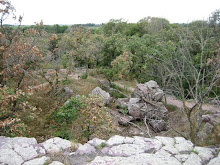
Beatrice had five children. What became of the daughter's schooling? The oldest son's work at a steel mill helped him finance a civil engineering degree. The three younger boys had muscular dystrophy. Theirs was the era of upright school buildings: massive sandstone things that came out of the ground with hardened perpendicularity. Steps to get in, steps to go up, steps to keep out. Beatrice's story (forgive me for not remembering it perfectly; I last heard it in the late 1980s or early 1990s--why am I so long in recording it adequately? I hope to tell the truth) is that she took one of her sons to the school and when he saw the steps, he cried. His physical challenge kept him out of school. Beatrice was angry; she spoke of genius, of being as smart as Einstein.
Remainders of these three sons' lives included paintings, a red wheel chair in the garage, and books. Many, many books. Were all the books for the boys or just one of them, or were some/most for the family? Don K. Richardson's return address label serves as a bookplate in one I recently opened--he lived the longest of the three. I believe the books were a compensation for the school. Books about Genghis Kahn, the Borgia family, Churchill, Truman. Books with titles like Mormon Country and Beyond the Ural Mountains. Books about plants, books of poetry, Joyce's Ulysses and The Brothers Karamazov.
Who of Beatrice's boys read these books? What did they think of them? How did these books shape their vision of living? Would they appreciate me applying Emily Dickinson's poetry to their situation, or would they accuse me of perky platitude?
He ate and drank the precious words,
His spirit grew robust;
He knew no more that he was poor,
Nor that his frame was dust.
He danced along the dingy days,
And this bequest of wings
Was but a book. What liberty
A loosened spirit brings!
I inherited many of the books from Beatrice's house. I have thought of living a life for those who did not or could not complete their own, but living my own is task enough.
I write this on the third floor of Beadle Hall in Madison, South Dakota. Beadle Hall is one of those erect school buildings (1886) whose spine is steps.
Photo by S. Richardson



